Impact of Lived Experiences on Person-Centred Mental Health Nursing
VerifiedAdded on 2023/06/05
|8
|2220
|433
Essay
AI Summary
This essay examines the critical role of lived experiences in mental health nursing, emphasizing their impact on person-centered care. It explores how understanding patients' past events and backgrounds enhances therapeutic relationships, promotes cultural competence, and improves patient outcomes. The essay highlights the importance of incorporating patients' perspectives in care planning and decision-making to reduce stigma and provide holistic care. Furthermore, it reflects on the author's nursing practice, identifying areas for improvement, particularly in establishing effective therapeutic relationships. The author proposes strategies such as improved communication, active listening, maintaining eye contact, and adhering to professional boundaries to foster trust and collaboration. The essay concludes that a deep understanding of lived experiences is essential for nurses to deliver high-quality, patient-focused mental health care.

UNIT:
NAME:
DATE:
NAME:
DATE:
Paraphrase This Document
Need a fresh take? Get an instant paraphrase of this document with our AI Paraphraser
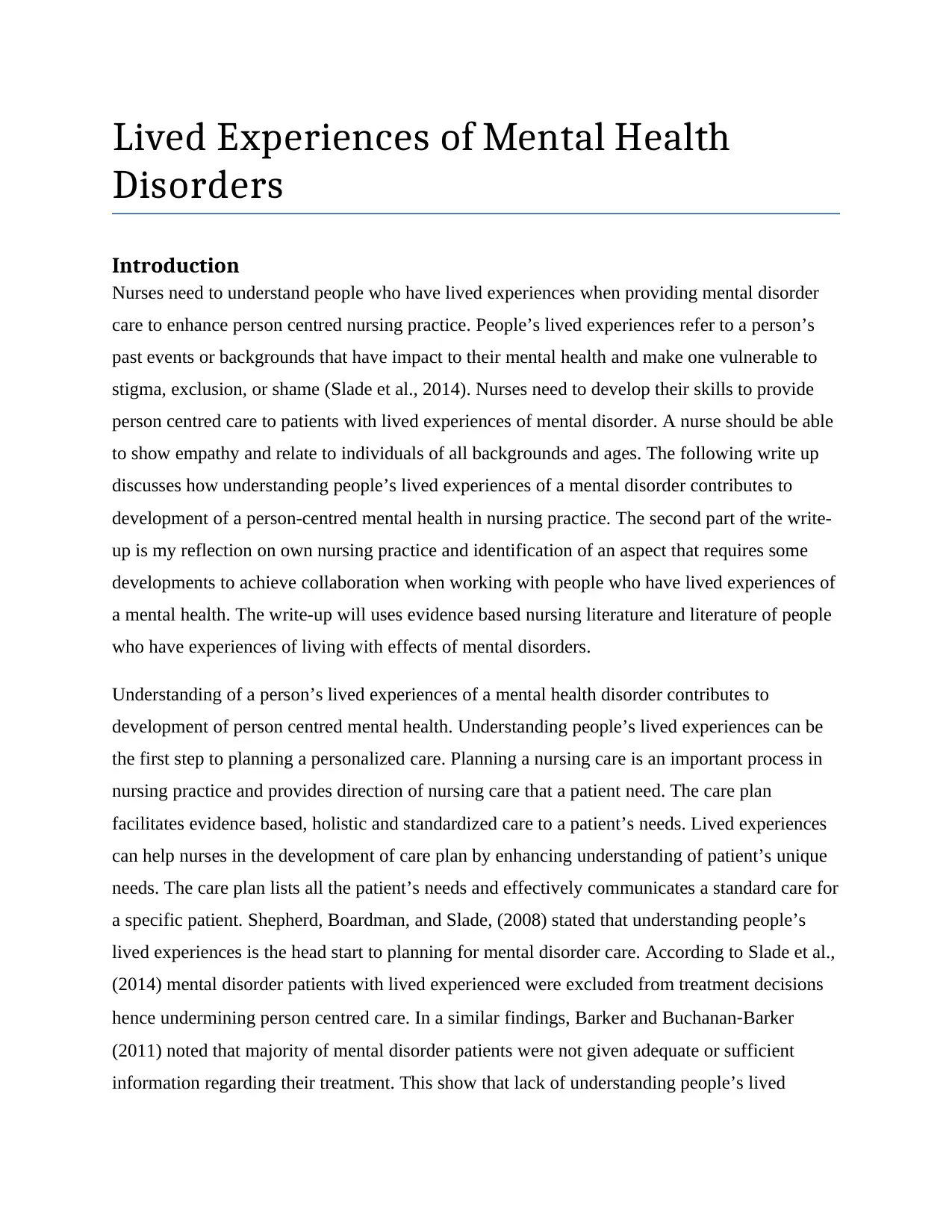
Lived Experiences of Mental Health
Disorders
Introduction
Nurses need to understand people who have lived experiences when providing mental disorder
care to enhance person centred nursing practice. People’s lived experiences refer to a person’s
past events or backgrounds that have impact to their mental health and make one vulnerable to
stigma, exclusion, or shame (Slade et al., 2014). Nurses need to develop their skills to provide
person centred care to patients with lived experiences of mental disorder. A nurse should be able
to show empathy and relate to individuals of all backgrounds and ages. The following write up
discusses how understanding people’s lived experiences of a mental disorder contributes to
development of a person-centred mental health in nursing practice. The second part of the write-
up is my reflection on own nursing practice and identification of an aspect that requires some
developments to achieve collaboration when working with people who have lived experiences of
a mental health. The write-up will uses evidence based nursing literature and literature of people
who have experiences of living with effects of mental disorders.
Understanding of a person’s lived experiences of a mental health disorder contributes to
development of person centred mental health. Understanding people’s lived experiences can be
the first step to planning a personalized care. Planning a nursing care is an important process in
nursing practice and provides direction of nursing care that a patient need. The care plan
facilitates evidence based, holistic and standardized care to a patient’s needs. Lived experiences
can help nurses in the development of care plan by enhancing understanding of patient’s unique
needs. The care plan lists all the patient’s needs and effectively communicates a standard care for
a specific patient. Shepherd, Boardman, and Slade, (2008) stated that understanding people’s
lived experiences is the head start to planning for mental disorder care. According to Slade et al.,
(2014) mental disorder patients with lived experienced were excluded from treatment decisions
hence undermining person centred care. In a similar findings, Barker and Buchanan‐Barker
(2011) noted that majority of mental disorder patients were not given adequate or sufficient
information regarding their treatment. This show that lack of understanding people’s lived
Disorders
Introduction
Nurses need to understand people who have lived experiences when providing mental disorder
care to enhance person centred nursing practice. People’s lived experiences refer to a person’s
past events or backgrounds that have impact to their mental health and make one vulnerable to
stigma, exclusion, or shame (Slade et al., 2014). Nurses need to develop their skills to provide
person centred care to patients with lived experiences of mental disorder. A nurse should be able
to show empathy and relate to individuals of all backgrounds and ages. The following write up
discusses how understanding people’s lived experiences of a mental disorder contributes to
development of a person-centred mental health in nursing practice. The second part of the write-
up is my reflection on own nursing practice and identification of an aspect that requires some
developments to achieve collaboration when working with people who have lived experiences of
a mental health. The write-up will uses evidence based nursing literature and literature of people
who have experiences of living with effects of mental disorders.
Understanding of a person’s lived experiences of a mental health disorder contributes to
development of person centred mental health. Understanding people’s lived experiences can be
the first step to planning a personalized care. Planning a nursing care is an important process in
nursing practice and provides direction of nursing care that a patient need. The care plan
facilitates evidence based, holistic and standardized care to a patient’s needs. Lived experiences
can help nurses in the development of care plan by enhancing understanding of patient’s unique
needs. The care plan lists all the patient’s needs and effectively communicates a standard care for
a specific patient. Shepherd, Boardman, and Slade, (2008) stated that understanding people’s
lived experiences is the head start to planning for mental disorder care. According to Slade et al.,
(2014) mental disorder patients with lived experienced were excluded from treatment decisions
hence undermining person centred care. In a similar findings, Barker and Buchanan‐Barker
(2011) noted that majority of mental disorder patients were not given adequate or sufficient
information regarding their treatment. This show that lack of understanding people’s lived
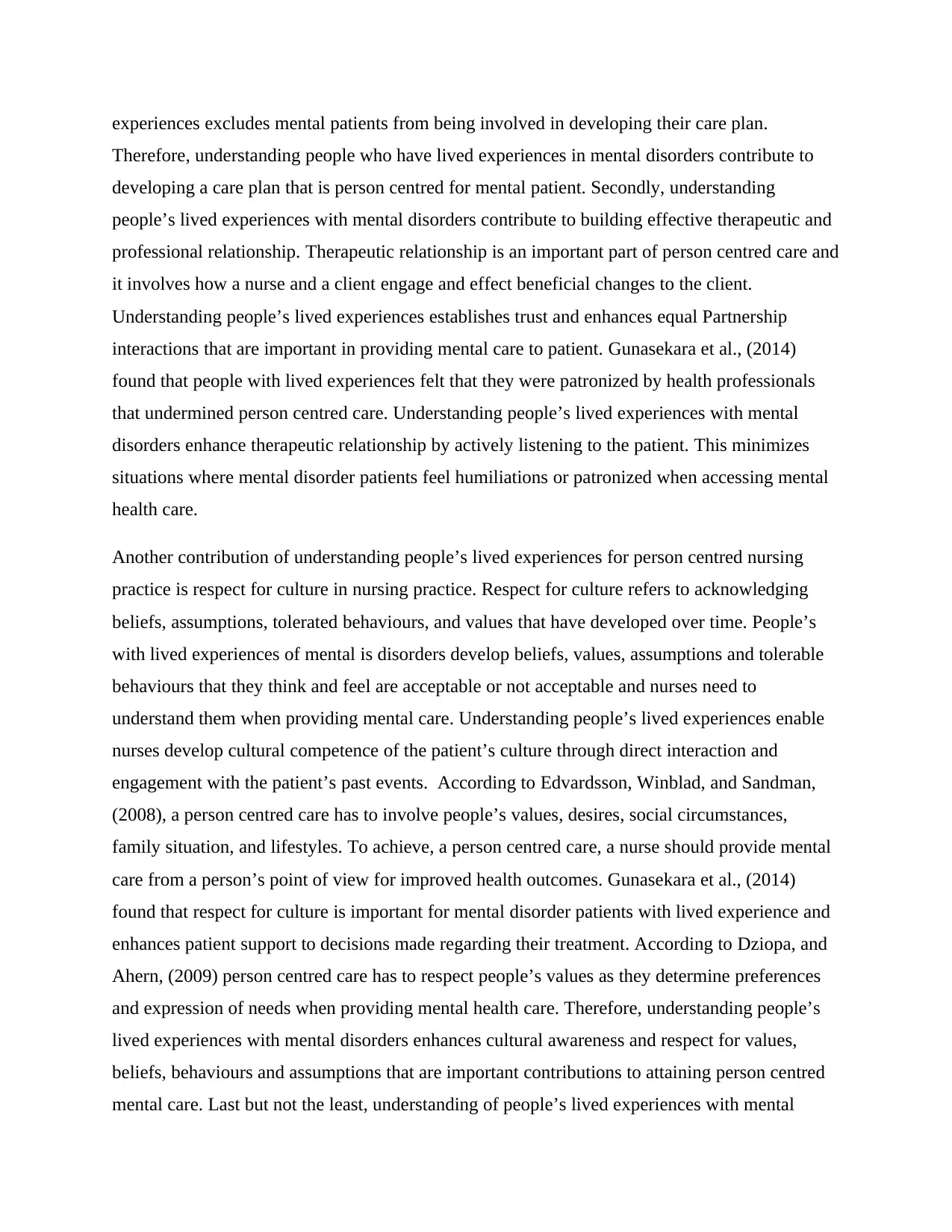
experiences excludes mental patients from being involved in developing their care plan.
Therefore, understanding people who have lived experiences in mental disorders contribute to
developing a care plan that is person centred for mental patient. Secondly, understanding
people’s lived experiences with mental disorders contribute to building effective therapeutic and
professional relationship. Therapeutic relationship is an important part of person centred care and
it involves how a nurse and a client engage and effect beneficial changes to the client.
Understanding people’s lived experiences establishes trust and enhances equal Partnership
interactions that are important in providing mental care to patient. Gunasekara et al., (2014)
found that people with lived experiences felt that they were patronized by health professionals
that undermined person centred care. Understanding people’s lived experiences with mental
disorders enhance therapeutic relationship by actively listening to the patient. This minimizes
situations where mental disorder patients feel humiliations or patronized when accessing mental
health care.
Another contribution of understanding people’s lived experiences for person centred nursing
practice is respect for culture in nursing practice. Respect for culture refers to acknowledging
beliefs, assumptions, tolerated behaviours, and values that have developed over time. People’s
with lived experiences of mental is disorders develop beliefs, values, assumptions and tolerable
behaviours that they think and feel are acceptable or not acceptable and nurses need to
understand them when providing mental care. Understanding people’s lived experiences enable
nurses develop cultural competence of the patient’s culture through direct interaction and
engagement with the patient’s past events. According to Edvardsson, Winblad, and Sandman,
(2008), a person centred care has to involve people’s values, desires, social circumstances,
family situation, and lifestyles. To achieve, a person centred care, a nurse should provide mental
care from a person’s point of view for improved health outcomes. Gunasekara et al., (2014)
found that respect for culture is important for mental disorder patients with lived experience and
enhances patient support to decisions made regarding their treatment. According to Dziopa, and
Ahern, (2009) person centred care has to respect people’s values as they determine preferences
and expression of needs when providing mental health care. Therefore, understanding people’s
lived experiences with mental disorders enhances cultural awareness and respect for values,
beliefs, behaviours and assumptions that are important contributions to attaining person centred
mental care. Last but not the least, understanding of people’s lived experiences with mental
Therefore, understanding people who have lived experiences in mental disorders contribute to
developing a care plan that is person centred for mental patient. Secondly, understanding
people’s lived experiences with mental disorders contribute to building effective therapeutic and
professional relationship. Therapeutic relationship is an important part of person centred care and
it involves how a nurse and a client engage and effect beneficial changes to the client.
Understanding people’s lived experiences establishes trust and enhances equal Partnership
interactions that are important in providing mental care to patient. Gunasekara et al., (2014)
found that people with lived experiences felt that they were patronized by health professionals
that undermined person centred care. Understanding people’s lived experiences with mental
disorders enhance therapeutic relationship by actively listening to the patient. This minimizes
situations where mental disorder patients feel humiliations or patronized when accessing mental
health care.
Another contribution of understanding people’s lived experiences for person centred nursing
practice is respect for culture in nursing practice. Respect for culture refers to acknowledging
beliefs, assumptions, tolerated behaviours, and values that have developed over time. People’s
with lived experiences of mental is disorders develop beliefs, values, assumptions and tolerable
behaviours that they think and feel are acceptable or not acceptable and nurses need to
understand them when providing mental care. Understanding people’s lived experiences enable
nurses develop cultural competence of the patient’s culture through direct interaction and
engagement with the patient’s past events. According to Edvardsson, Winblad, and Sandman,
(2008), a person centred care has to involve people’s values, desires, social circumstances,
family situation, and lifestyles. To achieve, a person centred care, a nurse should provide mental
care from a person’s point of view for improved health outcomes. Gunasekara et al., (2014)
found that respect for culture is important for mental disorder patients with lived experience and
enhances patient support to decisions made regarding their treatment. According to Dziopa, and
Ahern, (2009) person centred care has to respect people’s values as they determine preferences
and expression of needs when providing mental health care. Therefore, understanding people’s
lived experiences with mental disorders enhances cultural awareness and respect for values,
beliefs, behaviours and assumptions that are important contributions to attaining person centred
mental care. Last but not the least, understanding of people’s lived experiences with mental
⊘ This is a preview!⊘
Do you want full access?
Subscribe today to unlock all pages.

Trusted by 1+ million students worldwide
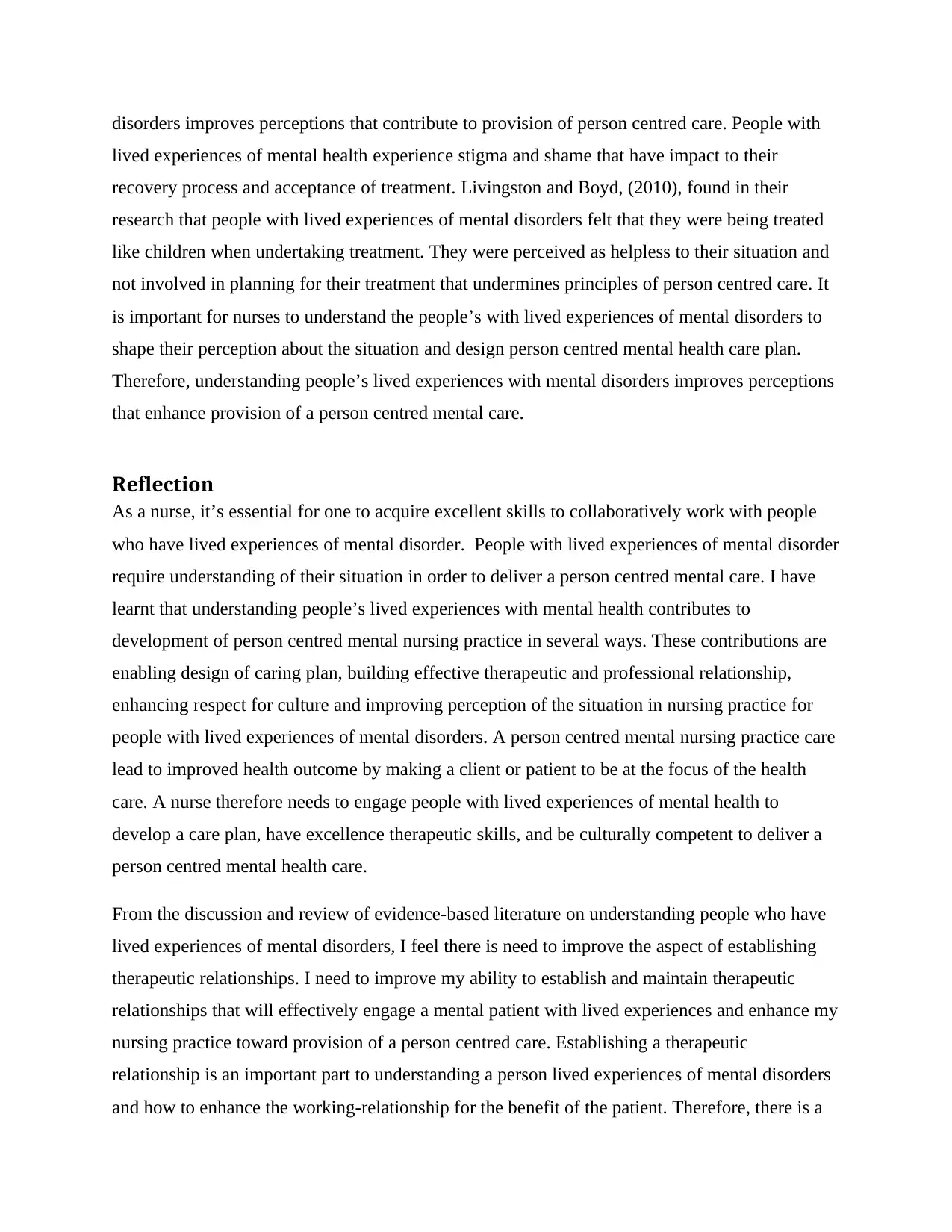
disorders improves perceptions that contribute to provision of person centred care. People with
lived experiences of mental health experience stigma and shame that have impact to their
recovery process and acceptance of treatment. Livingston and Boyd, (2010), found in their
research that people with lived experiences of mental disorders felt that they were being treated
like children when undertaking treatment. They were perceived as helpless to their situation and
not involved in planning for their treatment that undermines principles of person centred care. It
is important for nurses to understand the people’s with lived experiences of mental disorders to
shape their perception about the situation and design person centred mental health care plan.
Therefore, understanding people’s lived experiences with mental disorders improves perceptions
that enhance provision of a person centred mental care.
Reflection
As a nurse, it’s essential for one to acquire excellent skills to collaboratively work with people
who have lived experiences of mental disorder. People with lived experiences of mental disorder
require understanding of their situation in order to deliver a person centred mental care. I have
learnt that understanding people’s lived experiences with mental health contributes to
development of person centred mental nursing practice in several ways. These contributions are
enabling design of caring plan, building effective therapeutic and professional relationship,
enhancing respect for culture and improving perception of the situation in nursing practice for
people with lived experiences of mental disorders. A person centred mental nursing practice care
lead to improved health outcome by making a client or patient to be at the focus of the health
care. A nurse therefore needs to engage people with lived experiences of mental health to
develop a care plan, have excellence therapeutic skills, and be culturally competent to deliver a
person centred mental health care.
From the discussion and review of evidence-based literature on understanding people who have
lived experiences of mental disorders, I feel there is need to improve the aspect of establishing
therapeutic relationships. I need to improve my ability to establish and maintain therapeutic
relationships that will effectively engage a mental patient with lived experiences and enhance my
nursing practice toward provision of a person centred care. Establishing a therapeutic
relationship is an important part to understanding a person lived experiences of mental disorders
and how to enhance the working-relationship for the benefit of the patient. Therefore, there is a
lived experiences of mental health experience stigma and shame that have impact to their
recovery process and acceptance of treatment. Livingston and Boyd, (2010), found in their
research that people with lived experiences of mental disorders felt that they were being treated
like children when undertaking treatment. They were perceived as helpless to their situation and
not involved in planning for their treatment that undermines principles of person centred care. It
is important for nurses to understand the people’s with lived experiences of mental disorders to
shape their perception about the situation and design person centred mental health care plan.
Therefore, understanding people’s lived experiences with mental disorders improves perceptions
that enhance provision of a person centred mental care.
Reflection
As a nurse, it’s essential for one to acquire excellent skills to collaboratively work with people
who have lived experiences of mental disorder. People with lived experiences of mental disorder
require understanding of their situation in order to deliver a person centred mental care. I have
learnt that understanding people’s lived experiences with mental health contributes to
development of person centred mental nursing practice in several ways. These contributions are
enabling design of caring plan, building effective therapeutic and professional relationship,
enhancing respect for culture and improving perception of the situation in nursing practice for
people with lived experiences of mental disorders. A person centred mental nursing practice care
lead to improved health outcome by making a client or patient to be at the focus of the health
care. A nurse therefore needs to engage people with lived experiences of mental health to
develop a care plan, have excellence therapeutic skills, and be culturally competent to deliver a
person centred mental health care.
From the discussion and review of evidence-based literature on understanding people who have
lived experiences of mental disorders, I feel there is need to improve the aspect of establishing
therapeutic relationships. I need to improve my ability to establish and maintain therapeutic
relationships that will effectively engage a mental patient with lived experiences and enhance my
nursing practice toward provision of a person centred care. Establishing a therapeutic
relationship is an important part to understanding a person lived experiences of mental disorders
and how to enhance the working-relationship for the benefit of the patient. Therefore, there is a
Paraphrase This Document
Need a fresh take? Get an instant paraphrase of this document with our AI Paraphraser
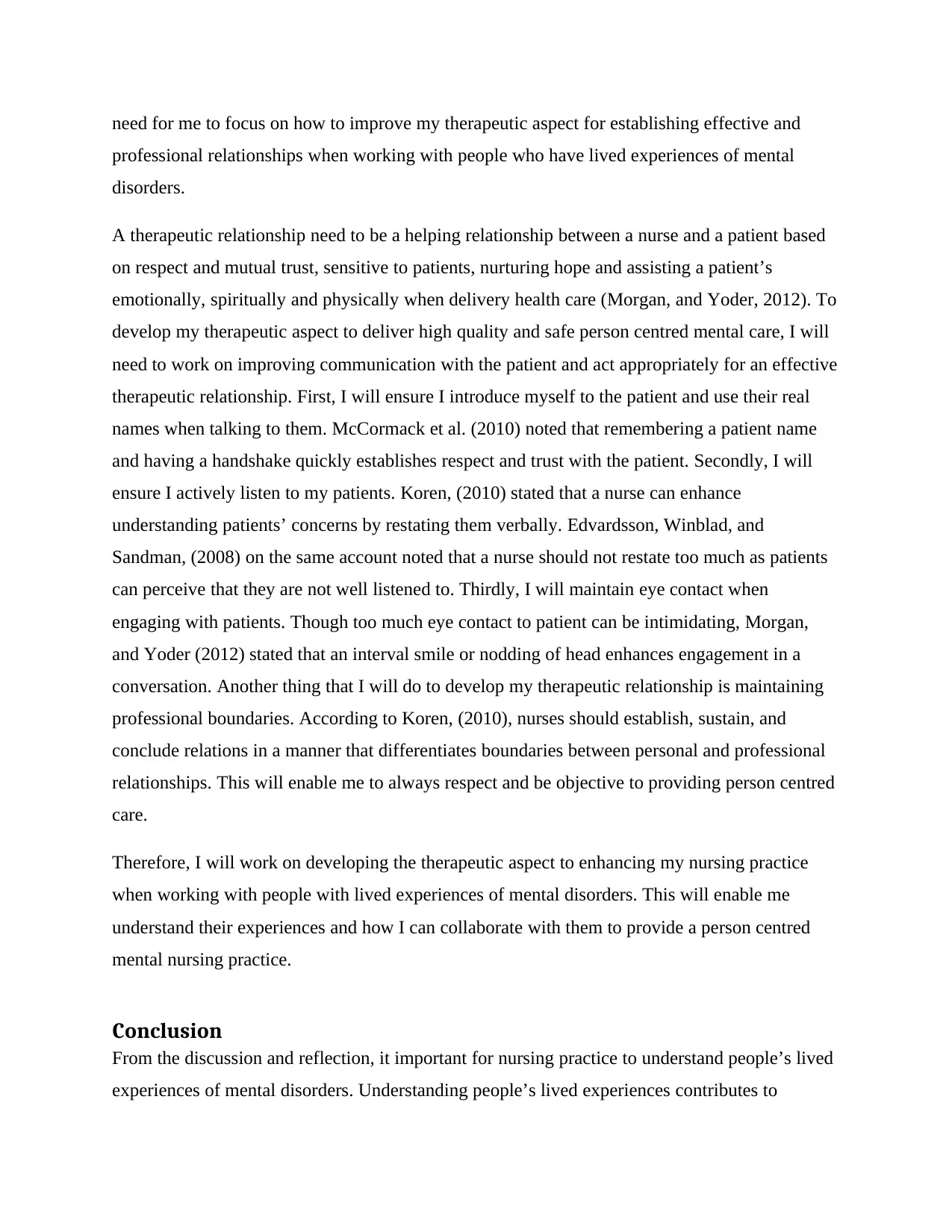
need for me to focus on how to improve my therapeutic aspect for establishing effective and
professional relationships when working with people who have lived experiences of mental
disorders.
A therapeutic relationship need to be a helping relationship between a nurse and a patient based
on respect and mutual trust, sensitive to patients, nurturing hope and assisting a patient’s
emotionally, spiritually and physically when delivery health care (Morgan, and Yoder, 2012). To
develop my therapeutic aspect to deliver high quality and safe person centred mental care, I will
need to work on improving communication with the patient and act appropriately for an effective
therapeutic relationship. First, I will ensure I introduce myself to the patient and use their real
names when talking to them. McCormack et al. (2010) noted that remembering a patient name
and having a handshake quickly establishes respect and trust with the patient. Secondly, I will
ensure I actively listen to my patients. Koren, (2010) stated that a nurse can enhance
understanding patients’ concerns by restating them verbally. Edvardsson, Winblad, and
Sandman, (2008) on the same account noted that a nurse should not restate too much as patients
can perceive that they are not well listened to. Thirdly, I will maintain eye contact when
engaging with patients. Though too much eye contact to patient can be intimidating, Morgan,
and Yoder (2012) stated that an interval smile or nodding of head enhances engagement in a
conversation. Another thing that I will do to develop my therapeutic relationship is maintaining
professional boundaries. According to Koren, (2010), nurses should establish, sustain, and
conclude relations in a manner that differentiates boundaries between personal and professional
relationships. This will enable me to always respect and be objective to providing person centred
care.
Therefore, I will work on developing the therapeutic aspect to enhancing my nursing practice
when working with people with lived experiences of mental disorders. This will enable me
understand their experiences and how I can collaborate with them to provide a person centred
mental nursing practice.
Conclusion
From the discussion and reflection, it important for nursing practice to understand people’s lived
experiences of mental disorders. Understanding people’s lived experiences contributes to
professional relationships when working with people who have lived experiences of mental
disorders.
A therapeutic relationship need to be a helping relationship between a nurse and a patient based
on respect and mutual trust, sensitive to patients, nurturing hope and assisting a patient’s
emotionally, spiritually and physically when delivery health care (Morgan, and Yoder, 2012). To
develop my therapeutic aspect to deliver high quality and safe person centred mental care, I will
need to work on improving communication with the patient and act appropriately for an effective
therapeutic relationship. First, I will ensure I introduce myself to the patient and use their real
names when talking to them. McCormack et al. (2010) noted that remembering a patient name
and having a handshake quickly establishes respect and trust with the patient. Secondly, I will
ensure I actively listen to my patients. Koren, (2010) stated that a nurse can enhance
understanding patients’ concerns by restating them verbally. Edvardsson, Winblad, and
Sandman, (2008) on the same account noted that a nurse should not restate too much as patients
can perceive that they are not well listened to. Thirdly, I will maintain eye contact when
engaging with patients. Though too much eye contact to patient can be intimidating, Morgan,
and Yoder (2012) stated that an interval smile or nodding of head enhances engagement in a
conversation. Another thing that I will do to develop my therapeutic relationship is maintaining
professional boundaries. According to Koren, (2010), nurses should establish, sustain, and
conclude relations in a manner that differentiates boundaries between personal and professional
relationships. This will enable me to always respect and be objective to providing person centred
care.
Therefore, I will work on developing the therapeutic aspect to enhancing my nursing practice
when working with people with lived experiences of mental disorders. This will enable me
understand their experiences and how I can collaborate with them to provide a person centred
mental nursing practice.
Conclusion
From the discussion and reflection, it important for nursing practice to understand people’s lived
experiences of mental disorders. Understanding people’s lived experiences contributes to
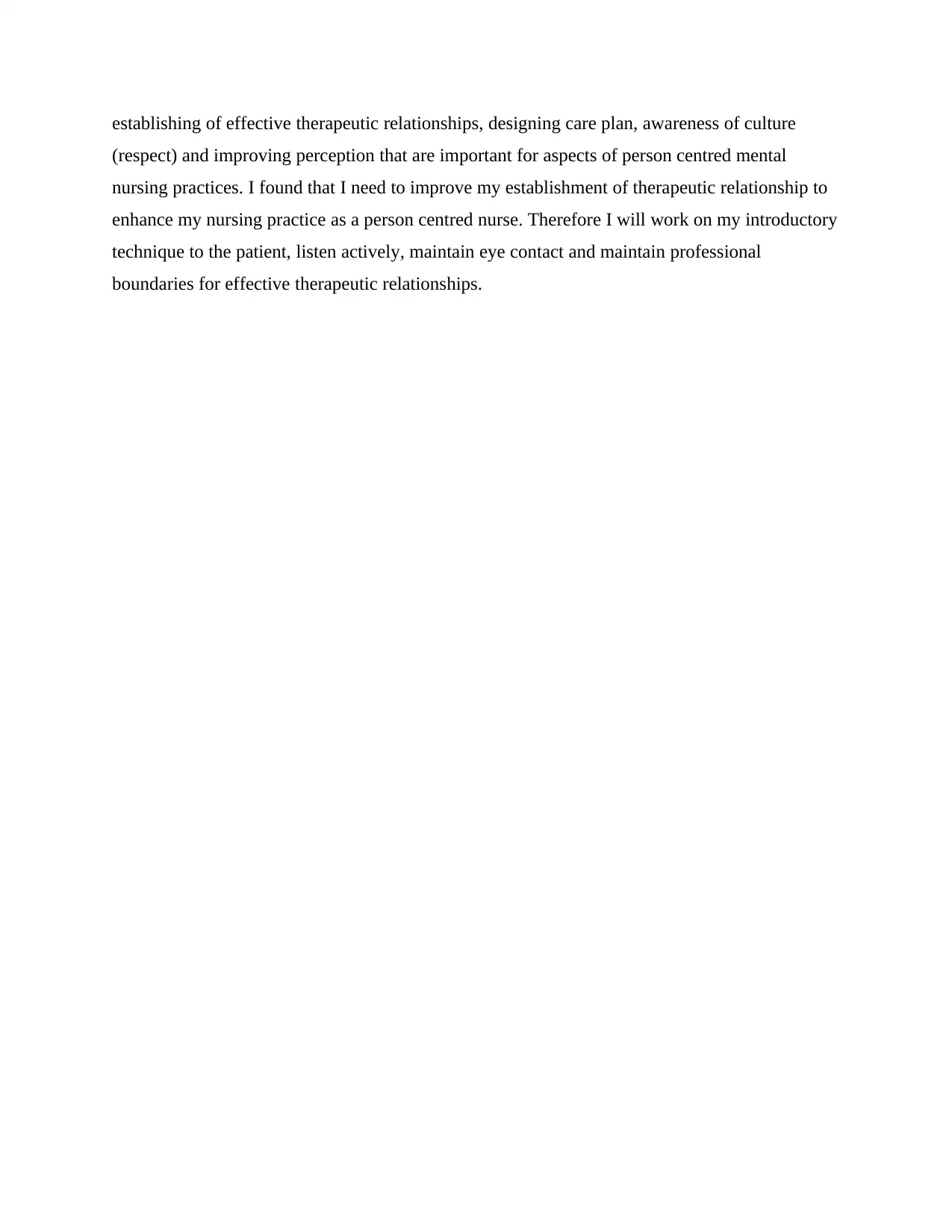
establishing of effective therapeutic relationships, designing care plan, awareness of culture
(respect) and improving perception that are important for aspects of person centred mental
nursing practices. I found that I need to improve my establishment of therapeutic relationship to
enhance my nursing practice as a person centred nurse. Therefore I will work on my introductory
technique to the patient, listen actively, maintain eye contact and maintain professional
boundaries for effective therapeutic relationships.
(respect) and improving perception that are important for aspects of person centred mental
nursing practices. I found that I need to improve my establishment of therapeutic relationship to
enhance my nursing practice as a person centred nurse. Therefore I will work on my introductory
technique to the patient, listen actively, maintain eye contact and maintain professional
boundaries for effective therapeutic relationships.
⊘ This is a preview!⊘
Do you want full access?
Subscribe today to unlock all pages.

Trusted by 1+ million students worldwide
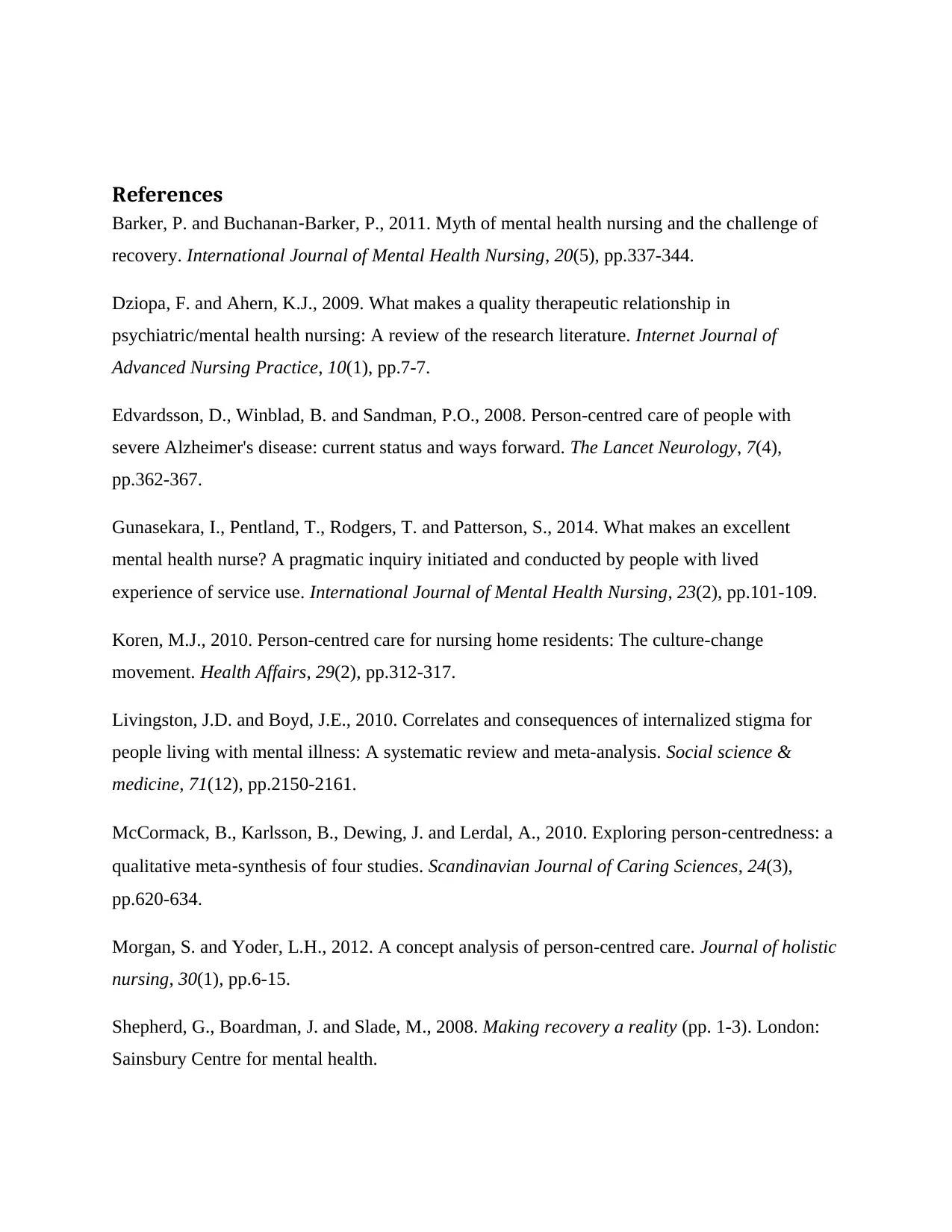
References
Barker, P. and Buchanan‐Barker, P., 2011. Myth of mental health nursing and the challenge of
recovery. International Journal of Mental Health Nursing, 20(5), pp.337-344.
Dziopa, F. and Ahern, K.J., 2009. What makes a quality therapeutic relationship in
psychiatric/mental health nursing: A review of the research literature. Internet Journal of
Advanced Nursing Practice, 10(1), pp.7-7.
Edvardsson, D., Winblad, B. and Sandman, P.O., 2008. Person-centred care of people with
severe Alzheimer's disease: current status and ways forward. The Lancet Neurology, 7(4),
pp.362-367.
Gunasekara, I., Pentland, T., Rodgers, T. and Patterson, S., 2014. What makes an excellent
mental health nurse? A pragmatic inquiry initiated and conducted by people with lived
experience of service use. International Journal of Mental Health Nursing, 23(2), pp.101-109.
Koren, M.J., 2010. Person-centred care for nursing home residents: The culture-change
movement. Health Affairs, 29(2), pp.312-317.
Livingston, J.D. and Boyd, J.E., 2010. Correlates and consequences of internalized stigma for
people living with mental illness: A systematic review and meta-analysis. Social science &
medicine, 71(12), pp.2150-2161.
McCormack, B., Karlsson, B., Dewing, J. and Lerdal, A., 2010. Exploring person‐centredness: a
qualitative meta‐synthesis of four studies. Scandinavian Journal of Caring Sciences, 24(3),
pp.620-634.
Morgan, S. and Yoder, L.H., 2012. A concept analysis of person-centred care. Journal of holistic
nursing, 30(1), pp.6-15.
Shepherd, G., Boardman, J. and Slade, M., 2008. Making recovery a reality (pp. 1-3). London:
Sainsbury Centre for mental health.
Barker, P. and Buchanan‐Barker, P., 2011. Myth of mental health nursing and the challenge of
recovery. International Journal of Mental Health Nursing, 20(5), pp.337-344.
Dziopa, F. and Ahern, K.J., 2009. What makes a quality therapeutic relationship in
psychiatric/mental health nursing: A review of the research literature. Internet Journal of
Advanced Nursing Practice, 10(1), pp.7-7.
Edvardsson, D., Winblad, B. and Sandman, P.O., 2008. Person-centred care of people with
severe Alzheimer's disease: current status and ways forward. The Lancet Neurology, 7(4),
pp.362-367.
Gunasekara, I., Pentland, T., Rodgers, T. and Patterson, S., 2014. What makes an excellent
mental health nurse? A pragmatic inquiry initiated and conducted by people with lived
experience of service use. International Journal of Mental Health Nursing, 23(2), pp.101-109.
Koren, M.J., 2010. Person-centred care for nursing home residents: The culture-change
movement. Health Affairs, 29(2), pp.312-317.
Livingston, J.D. and Boyd, J.E., 2010. Correlates and consequences of internalized stigma for
people living with mental illness: A systematic review and meta-analysis. Social science &
medicine, 71(12), pp.2150-2161.
McCormack, B., Karlsson, B., Dewing, J. and Lerdal, A., 2010. Exploring person‐centredness: a
qualitative meta‐synthesis of four studies. Scandinavian Journal of Caring Sciences, 24(3),
pp.620-634.
Morgan, S. and Yoder, L.H., 2012. A concept analysis of person-centred care. Journal of holistic
nursing, 30(1), pp.6-15.
Shepherd, G., Boardman, J. and Slade, M., 2008. Making recovery a reality (pp. 1-3). London:
Sainsbury Centre for mental health.
Paraphrase This Document
Need a fresh take? Get an instant paraphrase of this document with our AI Paraphraser

Slade, M., Amering, M., Farkas, M., Hamilton, B., O'Hagan, M., Panther, G., Perkins, R.,
Shepherd, G., Tse, S. and Whitley, R., 2014. Uses and abuses of recovery: implementing
recovery‐oriented practices in mental health systems. World Psychiatry, 13(1), pp.12-20.
Shepherd, G., Tse, S. and Whitley, R., 2014. Uses and abuses of recovery: implementing
recovery‐oriented practices in mental health systems. World Psychiatry, 13(1), pp.12-20.
1 out of 8
Related Documents
Your All-in-One AI-Powered Toolkit for Academic Success.
+13062052269
info@desklib.com
Available 24*7 on WhatsApp / Email
![[object Object]](/_next/static/media/star-bottom.7253800d.svg)
Unlock your academic potential
Copyright © 2020–2026 A2Z Services. All Rights Reserved. Developed and managed by ZUCOL.



